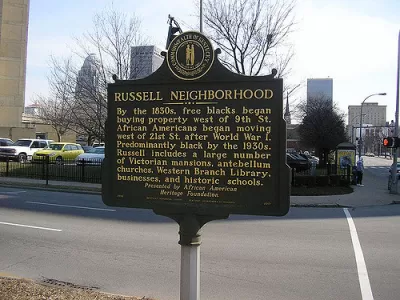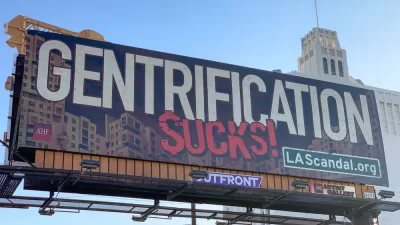A prominently Black and low-income neighborhood in Louisville could gain a new tool for spurring local development—the law is intended also to control the effects of gentrification.

Morgan Watkins reports: "A bipartisan group of [Kentucky] lawmakers wants to boost long-term, community-driven economic development in west Louisville — a region hurt by decades' worth of disinvestment — by establishing a tax increment financing district that ensures local tax dollars are reinvested in its neighborhoods."
"A TIF district allows for current development to be financed with future tax revenues from the increases in property values, as well as in sales taxes and other kinds of taxation, that are anticipated as an area's economic revitalization unfolds," explains Watkins.
The state law proposes a 30-year TIF district for "the part of the city that stretches west of Ninth Street and north of Algonquin Parkway," according to Watkins.
According to the article, the part of the city targeted for the TIF district is home to many of the city's Black residents, many of which are low-income. The legislators hope the TIF would address problems rooted in systemic racism awhile also including safeguards against gentrification. To ensure that property taxes stay reasonable for existing residents, the legislation would cap property tax increases based on values assessed this year. The legislation also includes provisions to encourage community involvement in vetting potential development projects.
FULL STORY: Bipartisan legislative plan would create economic development district in west Louisville

Maui's Vacation Rental Debate Turns Ugly
Verbal attacks, misinformation campaigns and fistfights plague a high-stakes debate to convert thousands of vacation rentals into long-term housing.

Planetizen Federal Action Tracker
A weekly monitor of how Trump’s orders and actions are impacting planners and planning in America.

In Urban Planning, AI Prompting Could be the New Design Thinking
Creativity has long been key to great urban design. What if we see AI as our new creative partner?

Massachusetts Budget Helps Close MBTA Budget Gap
The budget signed by Gov. Maura Healey includes $470 million in MBTA funding for the next fiscal year.

Milwaukee Launches Vision Zero Plan
Seven years after the city signed its Complete Streets Policy, the city is doubling down on its efforts to eliminate traffic deaths.

Portland Raises Parking Fees to Pay for Street Maintenance
The city is struggling to bridge a massive budget gap at the Bureau of Transportation, which largely depleted its reserves during the Civd-19 pandemic.
Urban Design for Planners 1: Software Tools
This six-course series explores essential urban design concepts using open source software and equips planners with the tools they need to participate fully in the urban design process.
Planning for Universal Design
Learn the tools for implementing Universal Design in planning regulations.
Gallatin County Department of Planning & Community Development
Heyer Gruel & Associates PA
JM Goldson LLC
City of Camden Redevelopment Agency
City of Astoria
Transportation Research & Education Center (TREC) at Portland State University
Jefferson Parish Government
Camden Redevelopment Agency
City of Claremont





























